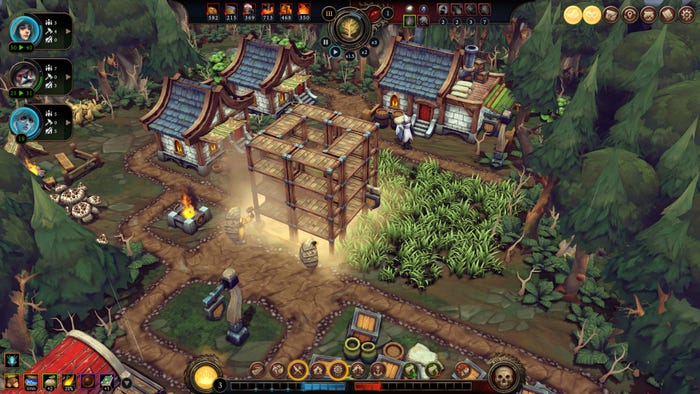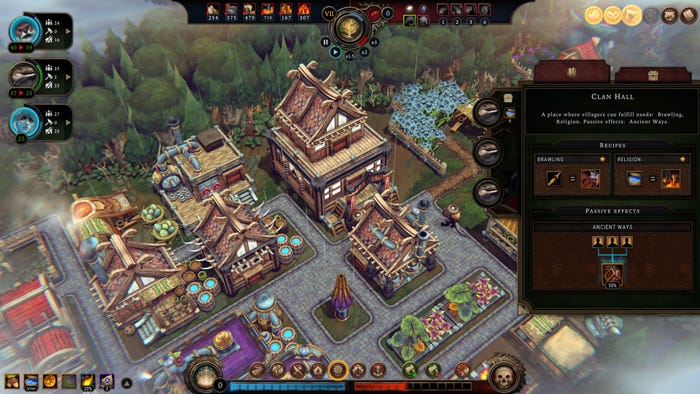Trending
Opinion: How will Project 2025 impact game developers?
The Heritage Foundation's manifesto for the possible next administration could do great harm to many, including large portions of the game development community.

| Dig in! Exploring Cooking Mechanics in Games | ||
| Every day this week, Game Developer is serving up a feast of interviews, deep dives, and more digging into the evolution of Cooking in video games. | ||
| Browse Latest Articles | Submit your Blog | |
Cooking is both a deeply personal act and the lifeblood of armies and civilizations.

When you live in a tiny apartment and grew up without proper instruction on seasoning your food, fictional cooking in video games can look far more appealing than spending a half-hour in your own kitchen. As Cooking Week rolls on here at Game Developer, I've had to yank myself away from drooling at the magnificent creations offered up in games like Good Pizza, Great Pizza and Cacao Cafe.
Loathe as I am to pick up the pot and pan (don't worry, I throw a lot of food in my air fryer to ensure I'm not only eating processed meals), I still catch myself thinking about cooking in the world of game design. When we began looking at games to feature this week, my eye drifted away from the more obvious titles and into the realm of strategy games and citybuilders that I've loved since childhood.
After all, a civilization is nothing without mass-produced food. We simulate the passing of the ages in the Civilization series by researching innovations like irrigation and domestication. Armies in the Total War series march on their stomachs, as any army would. And if you're building a game with different factions and many cultures, the preferences of your people's diets can shape what resources you prioritize in trade and harvest.
To discuss how these topics can fit into your next game, let's take a closer look at Eremite Games' roguelike city-builder Against the Storm.
Against the Storm's cooking system is one thread of a large tapestry of game balance meant to support the game's roguelike nature. Lead designer Michał Ogłoziński explained in his 2024 Game Developers Conference postmortem of Against the Storm that this system ensures every settlement (or spree of settlements) feels different every run.
Eremite Games shuffles a number of variables like unit races, resource availability, and tasks set by the Queen to offer different challenges and guide them down different paths. These variables are introduced the minute a new settlement is established—but as Ogłoziński pointed out, a number of consistent traits are in place to make sure every run is winnable, and that players don't feel screwed from the jump.
At the beginning of each run, players are assigned up to three races of villagers among their starting units. Each race has a set of unique skills and a series of "needs" that will maintain or boost their resolve.
Players also start each run with a modest stockpile of food and access to raw ingredients like meat, eggs, vegetables, or fruit in their starting vale. Because these ingredients will inevitably expire, they're incentivized to cut into new zones to make sure their people don't starve.
Villagers can feed on raw ingredients, but without more complex foods, their people may be demoralized and won't gain buffs that will help with other urgent tasks. Feeding only on raw ingredients also becomes less efficient as a settlement's population grows. These varying systems—and challenges sent down by the Queen that can push them to victory—incentivize the building of facilities that can produce bread, skewers, pies, etc.

Image via Eremite Games/Hooded Horse.
As intricate as this food system is, it exists side-by-side with the process of producing other goods like clothing, bricks, and oils. This means at the most abstract level, a delicious meal doesn't fulfill a different gameplay purpose than a comforting cloak.
Both are tools to chase certain gameplay objectives, and both are manufactured using similar processes. The downside of this system is that it can't fully express what makes cooking unique from other forms of production, but the upside is it places a greater priority on diversifying food sources in a way other games can't.
But, credit to Eremite Games, this system does support an important idea about depicting food in civilizational-level video games: that food isn't just a meter to be ticked up and down, it's a system that can express how people thrive and come together when food can be more than the bare essentials.
Designers familiar with psychology regularly reference Abraham Maslow's "Hierarchy of Needs" theory first published in 1945, which explores the notion of human motivation evolving to achieve different goals as basic needs for sustenance and survival give way for the need for community, a sense of belonging, self-esteem, and spiritual transcendence.
In survival games that have grown popular of late, it's a useful shorthand to express the player's journey of scrounging for essentials to building complex structures in Minecraft or massive fleets of spaceships in No Man's Sky. In Against the Storm, a similar design logic exists in how the player will prioritize the aesthetics of their settlement as they become more sustainable. It also uses this theory to build out the game's fictional world and show how food fits into a civilization struggling with a neverending magical storm.
The key design choice here is that complex foods beloved by different races aren't just an output of the many logistical equations, but also an input as well. The most basic system they play into is producing "Reputation," the resource needed to win a settlement run. When different races of villagers have their needs yet by goods such as complex foods, they produce Reputation, and the player inches closer and closer to victory.

Image via Eremite Games/Hooded Horse.
If that were the only purpose complex foods served, the player's objective would be to mainline facilities producing them and just pump out infinite amounts of it. But because of varying other needs from villagers, complex foods become a tool for other systems as well.
For instance "foods" like wine, beer, and tea are ingredients needed to operate "service buildings" like Taverns, Guild Houses, and Monasteries. These buildings offer global buffs that support other tasks and generate traits like "Religion," "Luxury," and "Leisure," which are craved by villagers and will boost their resolve.
Foods both raw and complex also fit into the game's trading system. Individual items can be bought and sold to individual traders and other settlements, but the most efficient way to make money off them is to package them in goods like "Packs of Crops," "Packs of Provisions," or "Packs of Luxury Goods."
Food-related items like Flour and Waterskins may also be packed into "Packs of Trade Goods" as well.
These systems balance the psychological benefits of good food against the commercial benefits. Players struggling against debuffs that make Resolve-based victories harder can still rely on food to win via commerce-related objectives.
With these high-level design choices, Eremite's philosophy of incentivizing different win conditions by increasing or decreasing certain variables is wide enough to support the many ways food fits into our society.
Against the Storm makes for a great case study in how the "higher-level" needs met by complex food still belong in survival-themed games where players are tasked with surviving in harsh elements. It's a great way to scrutinize the need for luxuries in hard times and ask players to evaluate if they're worth pursuing.
Designers on other strategy games may rightly point out that this particular resource management loop isn't right for their genre. But there's still inspiration that belongs in other games!
Strategy games about conventional warfare can explore how the physical act of moving food from A to B can be a lifeblood for armies or cities under siege. Business or city simulators could explore how different types of food are craved—and can evolve—in cities with multicultural populations. And games leaning into trade and negotiation could explore how supply and demand for food or ingredients goes beyond monetary value and into the social needs a person or society has for a particular flavor.
Food is such a key lifeblood for any society. And with the success of Against the Storm, developers working on games thinking about the nature of society and civilization should feel emboldened to explore why we value food once we step beyond individual kitchens.
Game Developer and Game Developers Conference are sibling organizations under Informa Tech.
You May Also Like